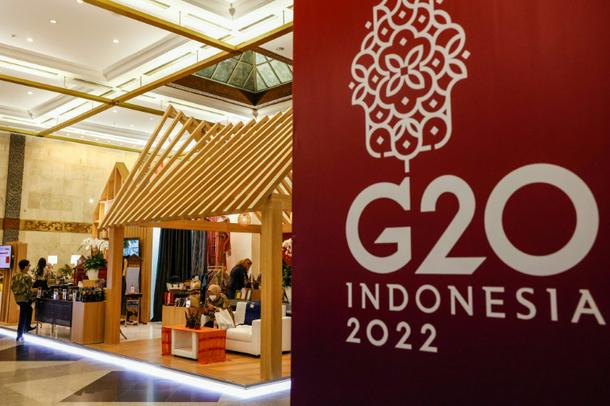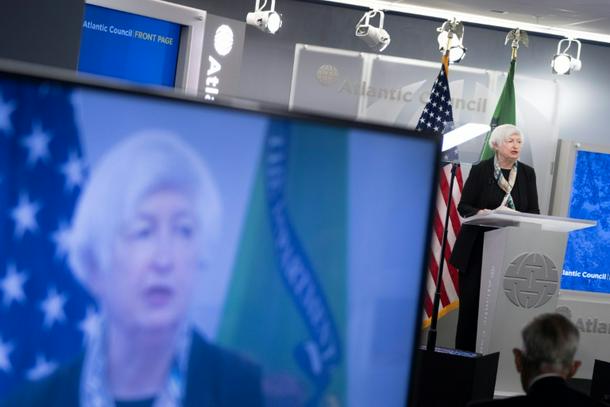
Some world finance leaders may boycott sessions of the G20 meetings in protest to Russia's presence
Washington (AFP) - Finance officials from the world’s richest countries are convening on Wednesday to address global challenges like rising debt and a possible food crisis – if they can overcome boiling tensions over Russia’s invasion of Ukraine.
Moscow’s attack on its neighbor looms over the meeting of G20 finance ministers and central bank governors, the first since Russian President Vladimir Putin ordered the invasion in late February.
Western nations have retaliated for the bloody incursion with sanctions meant to harm Russia’s economy and turn it into a pariah state.
US Treasury Secretary Janet Yellen intended to boycott some sessions if Russian officials were present, according to a senior US official, a stance France and other countries are expected to follow.
“We demand that Russia cease right now its military action, and we ask Russia to refrain from attending G20 meetings. War is not compatible with international cooperation,” French Finance Minister Bruno Le Maire said in the meeting.
The boycott threat underscores the tumult facing the Group of 20, and experts see little chance at this meeting for the bloc to find consensus on global challenges such as climate change and debt relief for poor nations.
“I think expectations should be extremely low,” said Matthew Goodman, senior vice president for economics at the Washington-based Center for Strategic and International Studies (CSIS).
“It’s hard to see how the G20 is going to pull together in the face of… the Ukraine crisis,” he said in an interview.
The G20, chaired by Indonesia this year, includes major economies like the United States, China, India, Brazil, Japan and several countries in Europe, including Russia.
Ukrainian Finance Minister Sergiy Marchenko attended the meeting’s opening session, according to a French spokesperson.
The finance officials are gathering virtually on the sidelines of the World Bank and IMF’s spring meetings in Washington.
Despite the friction, IMF Managing Director Kristalina Georgieva said global cooperation “must and will continue,” pointing to a long list of issues that “no country can solve on its own.”
Asked how the group can avoid fracture and still take action, Georgieva, who heads an institution with 189 members, told reporters, “I can vouch for the fact that it is more difficult when there are tensions, but it is not impossible.”
- Expected gridlock -
After the economic downturn caused by Covid-19, the global economy is facing a new shock caused by Russia’s invasion of its neighbor, which has driven prices for food and fuel higher and caused the IMF to lower the global growth outlook to 3.6 percent for this year.

US Treasury Secretary Janet Yellen will not attend some sessions of the G20 if Russian officials participate
Russian finance ministry officials were expected to participate in the G20 events remotely, but a US Treasury official said Yellen will make it clear that “the benefits and privileges of the leading economic institutions of the world… are reserved for countries that demonstrate respect for the core principles that underpin peace and security across the world.”
But the official said the group cannot let Russia stop the important work of the G20.
Speaking to reporters in Washington, German Finance Minister Christian Lindner said the country, which chairs the G7 group of liberal democracies, would try to find common ground if officials from Moscow participate in the meetings, but added, “We will not provide a stage for Russia to spread propaganda and lies.”
US President Joe Biden has proposed ejecting Russia from the G20 but Mark Sobel, a former Treasury official who is now US chairman of the Official Monetary and Financial Institutions Forum, told AFP there was no obvious mechanism for booting Moscow, which is to varying degrees supported by China and India.
“I think that it really does raise a fundamental question about how are you going to manage global governance,” he said of the tensions.
The divide also bodes ill for the G20 Common Framework, created during the pandemic to help heavily indebted countries find a path to restructure their debt, but which Sobel said is “flailing” as China and private sector creditors drag their feet on participating.
Washington and Beijing are increasingly at loggerheads over a host of issues unrelated to Ukraine, and Sobel said there is unlikely to be much progress over that initiative, either.
“Given the state of US-China tensions, I don’t think the US can speak really well to the China debt issues,” he said.